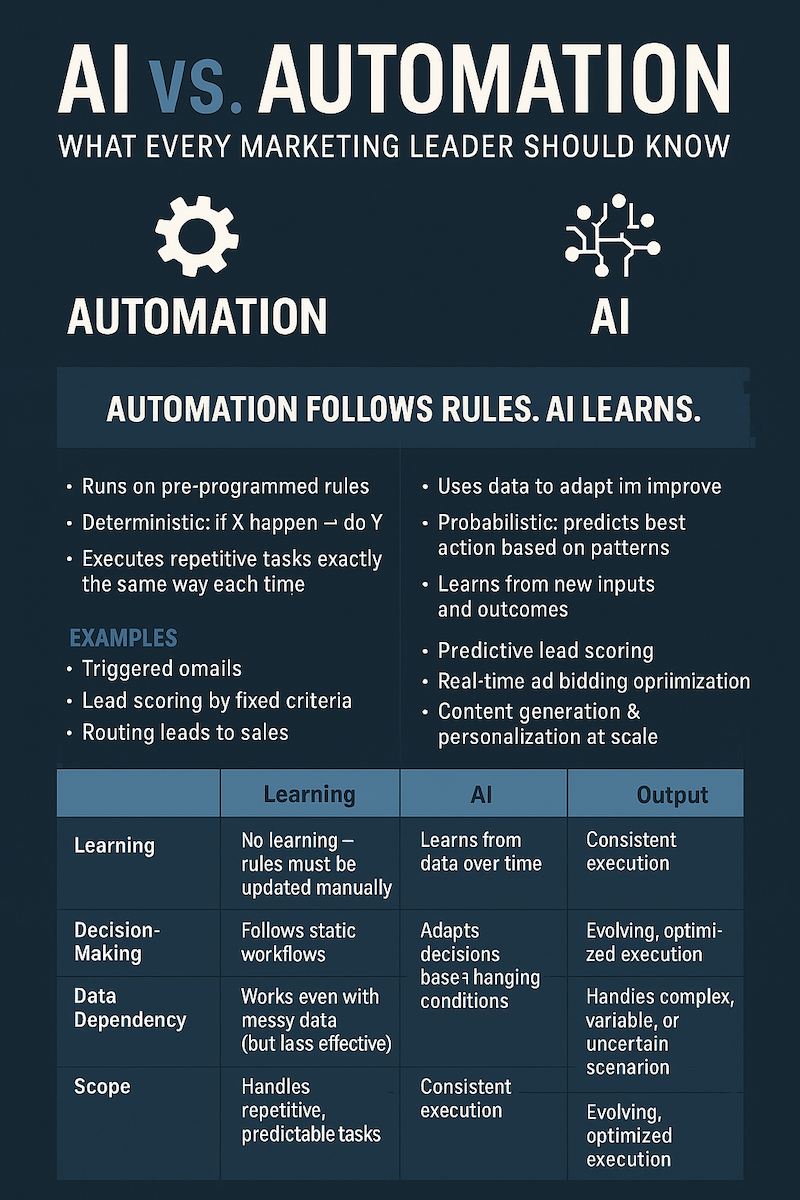AI Is Just Automation, Right?” Why That Assumption Is Slowing You Down
If your exec team thinks AI is just sending an email at the right time, you’ve got a problem and an opportunity.
I’ve been in marketing operations long enough to see “AI” slapped on a lot of things that are, frankly, just marketing automation in a new outfit. And while that confusion can be frustrating, it can also be incredibly useful if you know how to reframe it strategically.
Let’s break it down.
Automation Is NOT AI
Automation and AI both make marketing more efficient, but they are not the same thing.
Automation
Runs on pre-programmed rules.
Deterministic: if X happens, do Y.
Executes tasks exactly the same way every time.
Examples: triggered emails, lead scoring with fixed criteria, routing leads to sales.
AI
Uses data to adapt and improve.
Probabilistic: predicts the best action based on patterns.
Learns from new inputs and changes behavior over time.
Examples: predictive lead scoring, real-time ad bidding optimization, content personalization at scale.
The simplest way to remember it: Automation follows rules. AI learns.
Why Leaders Confuse the Two
From the outside, AI and automation can look similar, especially if the exec team isn’t hands-on in the tech stack. A triggered email feels smart if you’ve never built a nurture flow. Lead scoring sounds predictive even if it’s just a static point system.
This misunderstanding is so common that even well-funded companies blur the lines in presentations and investor decks.
Which brings me to the opportunity.
The Strategic Upside of the Confusion
If your CEO will open the budget for “AI initiatives” but not for “marketing operations clean-up,” congratulations, you’ve just found your wedge.
Here’s what I tell my clients:
Need budget for data hygiene? Call it AI data health infrastructure.
Need another ops hire? Position it as an AI Strategy Manager.
Need headcount for QA? Frame it as AI risk mitigation.
The reality: these are foundational ops investments you needed anyway. The narrative shift just makes them easier to sell internally.
The Danger of Overplaying It
Before you rename every ops project “AI-powered,” a warning:
AI fails fast without clean, accurate data.
MarTech bloat creates complexity that AI can’t fix.
Teams without AI literacy won’t get value from the tools.
I’ve audited dozens of martech stacks, and the truth is if you don’t fix the foundation, AI will amplify the chaos.
A Strategic Play for Marketing Leaders
Step 1: Audit the foundation
Check your data quality, automation logic, and system integrations. Identify bottlenecks before layering on AI.
Step 2: Map AI opportunities
Find where AI can add high-impact value: predictive analytics, personalization, content generation.
Step 3: Build the AI narrative
Translate operational needs into future-facing language that resonates with exec priorities and investor expectations.
Step 4: Upskill your team
Train for AI literacy, prompt engineering, and human-in-the-loop workflows. The tech is only as strong as the people using it.
The Bottom Line
Leadership may think AI is just smarter automation. You can let that misconception stall your progress or you can use it to get the resources you need to build a truly AI-ready marketing engine.
Just remember: the real ROI comes when you combine a rock-solid ops foundation with AI that can learn, adapt, and drive strategy. Without that, you’re just automating chaos.
If you’re not sure where your ops stand, or how to position them for AI investment, my AI Marketing Operations Audit will tell you exactly what’s holding you back, where AI can accelerate growth, and how to fix it fast. Learn more here.

